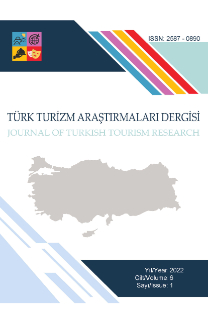Otel İşletmelerinde Rekabet Üstünlüğü Sağlayan Kritik Başarı Faktörleri: Trabzon İlindeki 4 ve 5 Yıldızlı Oteller Üzerine Bir Araştırma
Critical Success Factors Providing Competitive Advantage in Hotel Businesses: A Research on 4- and 5-Star Hotels in Trabzon Province
___
- Abdullah, A.A. and Hamdan, M.H. (2012). Internal Success Factor of Hotel Occupancy Rate, International Journal of Business and Social Science, 3(22): 199-218.
- Acar, D. ve Özçelik, H. (2011). Muhasebe Bilgi Kalitesini Etkileyen Kritik Başarı Faktörleri, Muhasebe ve Finansman Dergisi, (49): 10-23.
- Albayrak, A. (2014). Müşterilerin Restoran Seçimlerini Etkileyen Faktörler: İstanbul Örneği, Anatolia: Turizm Araştırmaları Dergisi, 25(2): 190-201.
- Altunışık, R., Coşkun, R., Bayraktaroğlu, S. ve Yıldırım, E. (2010). Sosyal Bilimlerde Araştırma Yöntemleri SPSS Uygulamalı (6. Baskı), Sakarya: Sakarya Yayıncılık.
- Arsezen-Otamış, P. (2015). Fethiye’de TripAdvisor’a Kayıtlı Yiyecek İçecek İşletmeleri için Kritik Başarı Faktörleri ve Sosyal Ağ Analizi ile Performans Değerlendirmesi, Journal of Tourism and Gastronomy Studies, 3(2): 31-39.
- Baker, M.J. and Cameron, E. (2007). Critical Success Factors in Destination Marketing, Tourism and Hospitality Research, 8(2): 79-97.
- Barry, W.B. (1986), Strategic Planning Workbook for Public and Nonprofit Organizations, St. Paul: Amberst Wilder Foundation.
- Brotherton, B and Shaw, J. (1996). Towards an identification and classification of Critical Success Factors in UK Hotels Pls, In.t J. Hospitality Management, 15(2): 113-135.
- Bryson, J.M. (1995). Strategic Planning for Public and Nonprofit Organizations, San Fransisco: Jossey Publishers.
- Bullen, C.V. and Rockart, J.F. (1981). A Primer on Critical Success Factors, Center for Information Systems Research, Sloan School of Management, Massachusetts Institute of Technology, CISR No. 69, Sloan WP No. 1220-81.
- Butler, T. and Fitzgerald, B. (1999). Unpacking the systems development process: an empirical application of the CSF concept in a research context, Journal of Strategic Information Systems, 8(4): 351-371.
- Cooper, L. (2010). CSFs, KPIs, Metrics, Outcomes and Benefits, [Online] http://www.itsmsolutions. com/newsletters/DITYvol6iss5.pdf [Erişim Tarihi: 17.09.2019]
- Çiçek Gökalp, E. (2003). Küçük Konaklama İşletmelerinin Yönetiminde Kritik Başarı Faktörlerinin Belirlenmesi Muğla Yöresinde Bir Alan Araştırması, Yayınlanmamış Yüksek Lisans Tezi, Muğla Üniversitesi, Muğla.
- DiPietro, R. B., Murphy, K. S., Rivera, M. and Muller, C. C. (2007). Multi-Unit Management Key Success Factors in The Casual Dining Restaurant İndustry, International Journal of Contemporary Hospitality Management, 19(7): 524-536.
- DiPietro, R. B., Parsa, H.G., and Gregory, A. (2011). Restaurant QSC inspections and financial performance: An Empirical Investigation, International Journal of Contemporary Hospitality Management, 23(7): 982-999.
- Filizözü, B. (2010). Stratejik Planlamada Kritik Başarı Faktörleri: THY Örneği, Yayınlanmamış Yüksek Lisans Tezi, Hacettepe Üniversitesi, Ankara
- Güler, S. (2007). Yiyecek ve İçecek İşletmeleri İçin Rekabet Avantajı Yaratacak Stratejik Seçenekler, Anatolia: Turizm Araştırmaları Dergisi, 18(1): 101-104
- Heung, V.C.S. and Chu, R. (2000). Important Factors Affecting Hong Kong Consumers’ Choice of a Travel Agency for All-Inclusive Package Tours, Journal of Travel Research, 39(1): 52-59. http://www.turob.com/Files/Dosyalar/excel/02062020.xls [Erişim Tarihi: 20.07.2020] https://trabzon.ktb.gov.tr/TR-164500/bakanligimizdan-turizm-isletme-belgeli-konaklama-tesisl- .html, [Erişim Tarihi: 21.07.2020]
- Hughes, M. and Carlsen, J. (2010). The business of cultural heritage tourism: critical success factors, Journal of Heritage Tourism, 5(1): 17-32.
- Hussey, D. (1998). Strategic Management, From theory to implementation- Fourth Edition, Oxford: Butterworth Heinemann.
- McLaren, L. (2011). Critical Marketing Success Factors for Sustainable Rural Tourism Routes: A Kwazulu-Natal Stakeholder Perspective, Yayınlanmamış M Phil. Tezi, University of Pretora, Güney Afrika.
- Rockart, F. J. (1979). Chef Executives Define Their Own Data Needs, Harward Business Review, 57(2): 81-93.
- Türkay, O., Kaya, M. C. ve Birer, Ş. (2013). Yiyecek-İçecek Çalışanlarının Mesleki Beklentilerinin Analizi: İstanbul Örneği, 14. Ulusal Turizm Kongresi, Erciyes Üniversitesi, 05-08 Aralık 2013. Kayseri. ss: 998-1015.
- Ülgen, H. ve Mirze, S. K. (2013), İşletmelerde Stratejik Yönetim, İstanbul: Beta Yayınları.
- Wohlfeil, F. and Terzidis, O. (2014). Critical Success Factors for the Strategic Management of Radical Technological Innovation, International Conference on Engineering, Technology and Innovation (ICE), 23-25 Haziran 2014. Bergamo. ss:1-9. DOI: 10.1109/ICE.2014.6871529
- Yüksel, İ. ve Dağdeviren, M. (2009). Kritik Başarı Faktörleri Temelinde Göreli Rekabet Üstünlüğünün Belirlenmesi, 6.KOBİ’ler ve Verimlilik Kongresi, İstanbul Kültür Üniversitesi, 17-18 Kasım 2009. İstanbul. s.s: 575-582.
- ISSN: 2587-0890
- Yayın Aralığı: Yılda 4 Sayı
- Başlangıç: 2017
- Yayıncı: Prof. Dr. Yüksel ÖZTÜRK
Dijital Seyahat Aracılarında E-Müşteri Tatmini ve E-Şikayetlere Yönelik Bir İçerik Analizi
Aşçıların Besin Öğeleri Hakkında Bilgi Düzeylerinin Ölçülmesi Üzerine Bir Araştırma
Şule ARDIÇ YETİŞ, Emrah KESKİN
Kültürel, Gastronomik ve Turistik Değer: Muğla’da Arıcılık ve Özel Muğla Arıcılık Müzesi Örneği
Gül ERKOL BAYRAM, Hasan Tahsin KAVLAK, Ersin ARIKAN, Ali Turan BAYRAM
Ilgaz Dağı Milli Parkı’nda Yer Alan Köylerin Kırsal Turizm Algısı
Canan TANRISEVER, İrfan MISIRLI, Gürkan ÇALIŞKAN
Çevrimiçi Müşteri Yorumları: Tripadvisor’da Çorum Restoranları Üzerine İnceleme*
Turizm Programlarında Sunulan E-Öğrenme Araçlarının Önem-Performans Analiziyle Değerlendirilmesi
Elazığ Mutfak Kültüründe Yer Alan Yöresel Yemeklerin İncelenmesi: Nitel Bir Araştırma
